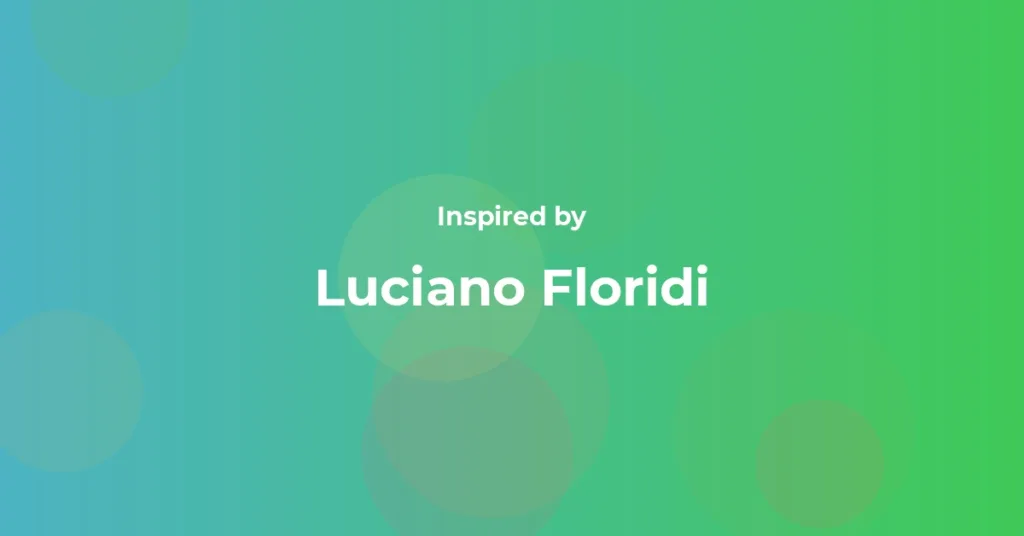
Luciano Floridi Famous Quotes and Affirmations
Luciano Floridi, a leading philosopher of information, has profoundly influenced contemporary thought on technology, ethics, and the digital age. As a pioneer in the field of information philosophy, Floridi’s work bridges the gap between theoretical philosophy and practical implications of the information revolution. His concepts, such as the “infosphere” and “onlife,” have reshaped how we understand the intersection of human life and digital environments. This article delves into Floridi’s most impactful ideas, showcasing verified quotes from his works, affirmations inspired by his philosophy, and an in-depth exploration of his contributions. Through his rigorous academic approach, Floridi has provided a framework for navigating the ethical and societal challenges of the 21st century, making his insights invaluable for scholars, technologists, and policymakers alike. Join us as we explore the mind of a thinker who continues to define the philosophy of our digital era.
Luciano Floridi Best Quotes
Below are verified quotes from Luciano Floridi’s original works, complete with exact citations to ensure authenticity and scholarly accuracy:
- “The infosphere is the whole informational environment constituted by all informational entities, their properties, interactions, processes, and mutual relations.” – Luciano Floridi, The Ethics of Information (2013), p. 6
- “Information ethics is the philosophical foundation for the proper handling of the design, management, and use of information and communication technologies.” – Luciano Floridi, The Ethics of Information (2013), p. 17
- “We are not standalone entities, but rather informational organisms (inforgs), mutually connected and embedded in an informational environment, the infosphere.” – Luciano Floridi, The Fourth Revolution (2014), p. 89
- “The onlife experience blurs the distinction between reality and virtuality, between human, machine, and nature.” – Luciano Floridi, The Onlife Manifesto (2015), p. 12
We recommend the following books for self improvement:

365 (+1) Affirmations to Supercharge Your Life
The one-of-a-kind program contained in this affirmation book, adorned with beautiful and colorful artworks, is meticulously designed to be wholeheartedly embraced by your subconscious mind, enabling you to manifest the life you desire.
Buy on Amazon
Small Habits Revolution: 10 Steps To Transforming Your Life Through The Power Of Mini Habits
If you're frustrated by failed attempts to adopt new habits, there's good news. The solution is within your grasp. This fast-moving guide provides actionable advice that will help you to make positive, purposeful, lasting changes in your life.
Buy on Amazon
Embrace What You Can’t Change
"Embrace What You Can’t Change" by the insightful duo Ahiranta Rinpoche and Ozay Rinpoche is a transformative guide that invites readers to navigate the complexities of life with grace and acceptance.
Buy on Amazon
We Can Do Better: A Self-Help Book for People Who Are Tired of Self-Help Books
We Can Do Better isn’t another book telling you to hustle harder or wake up at 5 a.m. It’s not about fixing yourself — it’s about finally giving yourself permission to stop performing and start feeling human again.
Buy on Amazon
The P.R.I.M.E.R. Goal Setting Method
Amazon bestselling author Damon Zahariades provides a clear, concise, and actionable system for accomplishing anything you set out to do. You'll learn how to approach goal setting in a way that practically guarantees success. Along the way, you'll experience a massive boost in self-confidence. After achieving goal after goal, you'll begin to anticipate success as a foregone conclusion.
Buy on AmazonThis post contains affiliate links. As an Amazon Associate, we earn from qualifying purchases at no additional cost to you.
Famous Luciano Floridi Aphorisms
While Luciano Floridi is known for his detailed and analytical writing, specific aphorisms—short, pithy statements—are less common in his work. However, the following concise insights extracted from his texts can be considered aphoristic in nature, with proper citations:
- “Information is power, and its ethical management is responsibility.” – Luciano Floridi, The Ethics of Information (2013), p. 19
- “The digital is our new reality.” – Luciano Floridi, The Fourth Revolution (2014), p. 23
Affirmations Inspired by Luciano Floridi
Below are 50 affirmations inspired by Luciano Floridi’s philosophy of information, ethics, and the digital age. These are not direct quotes but are crafted to reflect his ideas and encourage personal reflection on technology and human values:
- I embrace the digital world as part of my reality.
- I am an informational being, connected to the infosphere.
- I value the ethical use of technology in my daily life.
- I strive to understand the impact of information on society.
- I navigate the onlife experience with awareness and care.
- I respect the power of data and use it responsibly.
- I see myself as part of a larger informational ecosystem.
- I seek to balance technology and humanity in harmony.
- I am mindful of the ethical implications of my digital actions.
- I contribute positively to the infosphere with my choices.
- I adapt to the digital revolution with an open mind.
- I protect the integrity of information in my interactions.
- I embrace the interconnectedness of humans and machines.
- I reflect on how technology shapes my identity.
- I advocate for fairness in the digital landscape.
- I am conscious of the virtual and real worlds merging.
- I use information to empower myself and others.
- I prioritize ethics over convenience in technology use.
- I explore the boundaries of the infosphere with curiosity.
- I am a steward of the digital environment.
- I value privacy as a fundamental right in the digital age.
- I engage with technology thoughtfully and critically.
- I recognize the transformative power of information.
- I strive for a sustainable relationship with technology.
- I am part of the fourth revolution, shaping the future.
- I seek to understand the ethical dimensions of AI.
- I respect the complexity of the informational world.
- I am aware of my role in the digital ecosystem.
- I champion transparency in information systems.
- I embrace the challenges of the onlife reality.
- I use technology to enhance, not replace, human connection.
- I am guided by ethics in my digital interactions.
- I see information as a resource to be handled with care.
- I strive to create a positive digital footprint.
- I am attuned to the ethical needs of the infosphere.
- I reflect on the societal impact of my tech choices.
- I value the blend of human and machine intelligence.
- I am committed to learning about information ethics.
- I navigate the digital world with purpose and clarity.
- I am a mindful participant in the information age.
- I seek balance in the integration of technology and life.
- I respect the rights of others in the digital realm.
- I am inspired to innovate ethically in the digital space.
- I recognize the importance of data stewardship.
- I engage with the infosphere as a responsible citizen.
- I am open to evolving with the digital landscape.
- I prioritize ethical design in technology solutions.
- I see the digital age as an opportunity for growth.
- I am committed to protecting the infosp
- I embrace the philosophy of information in my life.
Main Ideas and Achievements of Luciano Floridi
Luciano Floridi, born in Rome, Italy, in 1964, is a philosopher whose work has fundamentally shaped the understanding of information and its ethical implications in the modern world. Currently a Professor of Philosophy and Ethics of Information at the University of Oxford and Director of the Digital Ethics Lab at the Oxford Internet Institute, Floridi has dedicated his career to exploring the philosophical dimensions of the digital age. His academic journey spans multiple disciplines, including logic, epistemology, and ethics, culminating in a body of work that addresses some of the most pressing issues of our time.
One of Floridi’s central contributions is the concept of the “infosphere,” a term he coined to describe the informational environment that encompasses both digital and non-digital information entities and their interactions. The infosphere is not merely a technological construct but a philosophical framework that redefines how humans interact with their surroundings in an era dominated by information and communication technologies (ICTs). Floridi argues that humans are not isolated entities but “inforgs” (informational organisms) embedded in this interconnected web of information. This perspective shifts traditional philosophical inquiries about reality and identity into a new domain where the boundaries between the physical and the digital blur.
Floridi’s philosophy of information (PI) is another cornerstone of his intellectual legacy. He defines PI as a field that studies the conceptual nature and basic principles of information, including its dynamics, utilization, and sciences. Unlike traditional philosophy, which often focuses on physical or metaphysical entities, PI places information at the center of philosophical analysis. Floridi’s approach is both descriptive and normative, seeking to understand information as it is while prescribing ethical guidelines for its management. His work in this area has provided a robust theoretical foundation for addressing issues like data privacy, cybersecurity, and the ethical design of artificial intelligence (AI) systems.
Another significant idea in Floridi’s oeuvre is the notion of “onlife,” a term he popularized to describe the seamless integration of online and offline experiences in contemporary life. The onlife condition reflects a reality where the distinction between virtual and physical interactions is increasingly irrelevant. Floridi suggests that this hybrid existence demands a rethinking of traditional ethical and social norms, as actions in the digital realm have tangible consequences in the physical world. This concept has profound implications for policy-making, education, and personal behavior, urging a holistic approach to life in the digital age.
Floridi’s achievements extend beyond theoretical contributions to practical applications in digital ethics. He has been instrumental in shaping public discourse on the ethical use of technology, advising governments, corporations, and international organizations. His role as a member of the EU’s High-Level Expert Group on Artificial Intelligence and his contributions to the European Commission’s policies on digital ethics highlight his influence on global tech governance. Floridi’s work emphasizes the need for a proactive ethical framework to address the challenges posed by AI, big data, and the internet of things (IoT), advocating for principles like transparency, accountability, and fairness.
Among his notable achievements is the authorship of numerous books and articles that have become foundational texts in philosophy and technology studies. His book The Fourth Revolution: How the Infosphere is Reshaping Human Reality (2014) argues that humanity is undergoing a fourth major revolution—following the Copernican, Darwinian, and Freudian revolutions—driven by information technology. This revolution, according to Floridi, reconfigures our understanding of ourselves and our place in the world, positioning ICTs as not just tools but as transformative forces that redefine human identity and agency.
Floridi’s ethical framework, detailed in works like The Ethics of Information (2013), introduces a macroethical perspective called “information ethics” (IE). Unlike traditional ethics, which often focuses on individual actions, IE considers the well-being of the entire infosphere, including non-human entities like data and digital environments. Floridi proposes four basic principles of information ethics: entropy ought not to be caused in the infosphere (null law), entropy ought to be prevented (first law), entropy ought to be removed (second law), and the flourishing of informational entities ought to be promoted (third law). These principles provide a novel way to address ethical dilemmas in technology, emphasizing the preservation and enhancement of information as a moral imperative.
In addition to his academic and advisory roles, Floridi has contributed to public understanding through lectures, interviews, and media appearances. His ability to distill complex philosophical ideas into accessible concepts has made him a prominent voice in debates about technology’s societal impact. He has consistently argued for the importance of education in fostering digital literacy and ethical awareness, believing that informed citizens are crucial for a healthy digital society.
Floridi’s interdisciplinary approach, combining philosophy with insights from computer science, sociology, and law, has positioned him as a leading thinker in the digital humanities. His work challenges conventional boundaries between disciplines, encouraging a synthesis of knowledge to address the multifaceted challenges of the information age. By framing information as a fundamental philosophical concept, Floridi has opened new avenues for research and debate, influencing fields as diverse as AI ethics, data protection, and digital policy.
His recognition in academic circles is evidenced by numerous awards and honors, including fellowships and visiting professorships at prestigious institutions worldwide. Floridi’s influence is not limited to philosophy; his ideas have permeated technology development, policy formulation, and even cultural discussions about the role of technology in human life. His emphasis on ethical responsibility in the design and use of technology serves as a reminder that innovation must be accompanied by reflection and care.
In summary, Luciano Floridi’s main ideas and achievements revolve around the philosophy of information, the concept of the infosphere, and the ethical challenges of the digital age. His work provides a comprehensive framework for understanding and navigating the complexities of a world increasingly shaped by information technologies. Through his theoretical innovations and practical contributions, Floridi has established himself as a pivotal figure in contemporary philosophy, offering insights that are both timeless and urgently relevant to our current and future challenges.
Magnum Opus of Luciano Floridi
Luciano Floridi’s magnum opus can be considered a combination of his seminal works, with The Fourth Revolution: How the Infosphere is Reshaping Human Reality (2014) and The Ethics of Information (2013) standing out as the most comprehensive articulations of his philosophy. However, for the purpose of this discussion, The Fourth Revolution is often regarded as his most influential and widely recognized contribution, encapsulating his core ideas about the transformative impact of information technology on human life. Published by Oxford University Press, this book synthesizes Floridi’s earlier work on the philosophy of information and the infosphere, presenting a compelling narrative about humanity’s place in the digital age.
In The Fourth Revolution, Floridi argues that information and communication technologies (ICTs) are driving a fourth major revolution in human history, following the Copernican, Darwinian, and Freudian revolutions. Each of these earlier revolutions displaced humans from a central position in the universe, nature, and their own minds, respectively. The fourth revolution, according to Floridi, reconfigures our understanding of reality itself through the lens of information. He posits that ICTs are not merely tools but forces that reshape human identity, social structures, and ethical norms. This central thesis is a culmination of Floridi’s decades-long exploration of information as a philosophical concept, making the book a definitive statement of his intellectual project.
The book introduces the concept of the “infosphere” in a way that is accessible to a broad audience, defining it as the totality of informational entities and their interactions, encompassing both digital and analog information. Floridi describes humans as “inforgs”—informational organisms—living in and contributing to this environment. This perspective challenges traditional philosophical notions of individuality and autonomy, suggesting that humans are inherently connected to a vast network of information that influences and is influenced by their actions. The infosphere is not a passive backdrop but an active space where ethical considerations must be applied to preserve its integrity and ensure the flourishing of all informational entities.
Floridi also explores the concept of “onlife,” a term that captures the blending of online and offline experiences in contemporary life. He argues that this hybrid reality requires a rethinking of traditional categories like public and private, real and virtual. The onlife condition has profound implications for how we understand privacy, identity, and social interaction, as digital actions often have tangible consequences in the physical world. Floridi’s analysis in The Fourth Revolution provides a framework for addressing these challenges, emphasizing the need for new ethical guidelines that account for the unique nature of digital environments.
One of the book’s key contributions is its discussion of how ICTs are transforming human self-understanding. Floridi contends that the fourth revolution forces us to reconsider fundamental questions about who we are and how we relate to the world. For instance, the proliferation of data and algorithms influences decision-making processes, blurring the lines between human agency and machine intervention. Floridi warns of the risks associated with this shift, such as loss of control over personal information and the potential for surveillance, while also highlighting opportunities for enhanced connectivity and knowledge sharing. His balanced approach neither demonizes technology nor uncritically celebrates it, instead advocating for a nuanced understanding of its role in human life.
Ethically, The Fourth Revolution builds on Floridi’s earlier work in The Ethics of Information by applying the principles of information ethics to the broader societal impacts of ICTs. He reiterates the importance of preserving the infosp
Floridi’s writing in The Fourth Revolution is notable for its clarity and interdisciplinary scope. He draws on philosophy, computer science, sociology, and history to construct a comprehensive argument about the information revolution. This interdisciplinary approach is reflective of Floridi’s broader methodology, which seeks to bridge theoretical inquiry with practical application. The book is not only a philosophical treatise but also a guide for navigating the ethical and social challenges of the digital age, making it a vital resource for scholars and practitioners alike.
The impact of The Fourth Revolution extends beyond academia, influencing public policy and corporate practices related to technology. Floridi’s ideas have been adopted by organizations seeking to develop ethical guidelines for AI and data management, demonstrating the real-world relevance of his work. The book has also inspired further research into the philosophy of information, cementing Floridi’s status as a leading thinker in this field. Its accessibility ensures that it reaches a wide audience, from students and educators to policymakers and tech professionals, all of whom can benefit from its insights.
Critically, The Fourth Revolution is not without its challenges. Some scholars have questioned whether the analogy to earlier revolutions fully captures the unique nature of ICTs, arguing that the information revolution may not displace humans in the same way as previous paradigm shifts. Others have noted that Floridi’s focus on the infosphere and informational entities can sometimes feel abstract, lacking concrete solutions for immediate ethical dilemmas. Nevertheless, these critiques do not diminish the book’s significance as a foundational text that redefines philosophical inquiry in the context of technology.
In conclusion, The Fourth Revolution stands as Luciano Floridi’s magnum opus due to its comprehensive exploration of the information revolution and its implications for human life. It encapsulates his key concepts—the infosphere, onlife, and information ethics—while offering a visionary perspective on the future of technology and society. Through this work, Floridi has not only advanced philosophical thought but also provided a practical framework for addressing the ethical challenges of the digital age, ensuring its enduring relevance in an ever-evolving world.
Interesting Facts About Luciano Floridi
Luciano Floridi’s life and career are marked by a series of fascinating details that highlight his unique position as a philosopher of the digital age. Born in Rome, Italy, in 1964, Floridi’s early academic pursuits were rooted in classical philosophy, earning a degree from the University of Rome “La Sapienza.” His interest in logic and epistemology eventually led him to explore the philosophical implications of information technology, a field that was still emerging during his formative years. This transition from traditional philosophy to the philosophy of information reflects his ability to anticipate and address the intellectual challenges of the 21st century.
Floridi’s academic journey took him across continents, with significant periods spent in the United Kingdom and the United States. He completed his MPhil and PhD at the University of Warwick, where he began to formulate his ideas about information as a central philosophical concept. His international exposure has shaped his interdisciplinary approach, blending European philosophical traditions with Anglo-American analytical methods. This global perspective is evident in his work, which often addresses universal issues related to technology and ethics.
One intriguing aspect of Floridi’s career is his role as one of the first philosophers to systematically address the ethical implications of digital technologies. In the late 1990s and early 2000s, when the internet was still in its infancy, Floridi was already theorizing about the “infosphere” and its impact on human life. His foresight in recognizing the transformative power of information technology has earned him a reputation as a visionary thinker, often ahead of his time in identifying key societal trends.
Floridi has held numerous prestigious positions, including the UNESCO Chair in Information and Computer Ethics and the Gaia Foundation Chair in Philosophy at the University of Hertfordshire before joining the University of Oxford. His current role as Director of the Digital Ethics Lab at the Oxford Internet Institute places him at the forefront of research into the ethical dimensions of technology. This position allows him to influence both academic discourse and practical policy-making, bridging the gap between theory and application.
Beyond his academic roles, Floridi has been actively involved in shaping global policies on technology and ethics. He has served on advisory boards for the European Union and other international bodies, contributing to frameworks for AI governance and data protection. His ability to translate complex philosophical ideas into actionable recommendations has made him a sought-after consultant for governments and corporations navigating the ethical challenges of the digital age.
An interesting personal detail is Floridi’s passion for clarity and communication. Despite the complexity of his subject matter, he has a knack for making abstract concepts accessible to a wider audience. His lectures and public talks often draw diverse crowds, from students to tech entrepreneurs, all eager to understand the philosophical underpinnings of the digital world. This commitment to public engagement underscores his belief in the importance of education and awareness in fostering a responsible digital society.
Floridi’s prolific output is another noteworthy fact. He has authored or edited over a dozen books and published hundreds of articles, covering topics ranging from information ethics to the philosophy of technology. His dedication to scholarship is matched by his willingness to engage with emerging issues, ensuring that his work remains relevant in a rapidly changing technological landscape. This productivity reflects not only his intellectual curiosity but also his commitment to addressing the urgent ethical questions posed by modern technology.
Lastly, Floridi’s influence extends to popular culture, where his ideas about the infosphere and onlife have been referenced in discussions about digital identity and virtual reality. While not a household name, his concepts have permeated broader conversations about technology’s role in society, illustrating the real-world impact of his philosophical work. This intersection of academia and public discourse highlights Floridi’s unique ability to shape both thought and action in the digital era.
Daily Affirmations that Embody Luciano Floridi Ideas
Below are 15 daily affirmations inspired by Luciano Floridi’s philosophy, designed to encourage mindfulness and ethical engagement with the digital world:
- Today, I will navigate the infosphere with care and responsibility.
- I am connected to a vast network of information and will contribute positively.
- I embrace my role as an informational organism in the digital age.
- I will use technology ethically to enhance my life and others’.
- I am mindful of the onlife blend of virtual and real experiences.
- I protect the integrity of the information I share and receive.
- I strive to reduce informational entropy in my digital interactions.
- I value privacy and fairness in the digital environment.
- I reflect on how technology shapes my identity and choices.
- I am committed to learning about the ethics of information.
- I engage with the digital world as a thoughtful citizen.
- I seek balance between my online and offline lives.
- I advocate for transparency in the use of data and algorithms.
- I am inspired to innovate with ethical principles in mind.
- I contribute to the flourishing of the infosphere every day.
Final Word on Luciano Floridi
Luciano Floridi stands as a towering figure in contemporary philosophy, offering profound insights into the digital age through his concepts of the infosphere, onlife, and information ethics. His work challenges us to rethink our relationship with technology, urging a balance between innovation and ethical responsibility. As a philosopher, educator, and advisor, Floridi has not only shaped academic discourse but also influenced global policies on technology governance. His vision of humans as informational organisms embedded in a vast digital ecosystem remains a powerful framework for understanding our evolving reality. Ultimately, Floridi’s legacy lies in his call for a mindful, ethical approach to the information revolution—one that prioritizes the flourishing of all entities within the infosphere. His contributions ensure that as we advance technologically, we do so with a deep awareness of our shared humanity and the responsibilities it entails.








